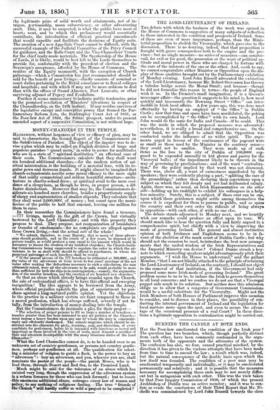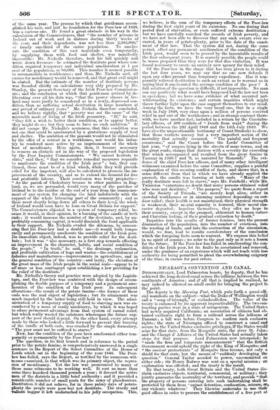BURNING THE CANDLE AT BOTH ENDS.
KA8 the Poor-law ameliorated the condition of the Irish poor ? The question has two branches, which, though perfectly distinct from each other, have been commonly confounded in the argu- ments both of the opponents and the advocates of the system. The confusion has also, we fear, caused practical mischief, by the direction it has given to the various attempts that have been made from time to time to amend the law ; a result whioh was, indeed, but the natural consequence of the double basis upon which the law itself was founded. The condition of a poor man may be ameliorated temporarily and individu4ly, or it may be ameliorated permanently and relatively; and it is possible that the measures necessary for accomplishing those ends maybe not merely differ- ent but in antagonism with each other. This' was the view taken by that Poor Inquiry Commission of 1836, of 'which the present Archbishop of Dublin was an active member; and it was to con- fute or evade the conclusions of their Third Report that Mr. Ni- cholls was commissioned by Lord Man Eusiell towards the close of the same year. The process by which that gentleman accom- plished his task, and laid he foundation for the Poor-law of 1838, was a curious one. He found a great obstacle in his way in the calculation of the Commissioners, that "the number of persons in Ireland out of work and in distress during thirty weeks of the year, and their dependents, was not less than 2,385,000," or nearly one-third of the entire population. To amelio- rate the condition of this vast multitude even temporarily, by supplying them with food and shelter, was manifestly impossible: Mr. Nicholls therefore, took his bill quickly and wrote down fivescare—he estimated the destitute poor whose con- dition required temporary and individual amelioration at 1 per cent of the population, or 80,000. This number it seemed possible to aecommoAate in workhouses ; and thus, Mr. Nicholls said, all excuse for mendicancy would be removed, and that great evil might be abated. But the estimate of the number of destitute persons was founded chiefly on calculations very ably prepared by Mr. Stanley, the present Secretary of the Irish Poor-law Commission- ers; and the conclusion at which that gentleman arrived by de- liberating over all his data was, "that the poorer classes in Ire- land may more justly be considered as in a lowly, depressed con- dition, than as suffering actual destitution in large numbers at any period of ordinary years." Mr. Nicholls therefore concluded, and we believe rightly, that "poverty was not the cause" of the miserable mode of living of the Irish peasantry. "If," he said, "they felt a wish to better their condition, or to appear better, they might do so ; but they seem to have no such ambition." It did not escape Mr. Nicholls's acuteness, that this condition was not one that could be ameliorated by a gratuitous supply of food and shelter. The ambition of the peasant would not be stimulated by the offer of a retreat in a workhouse, nor would his indus- try be rendered more active by an imprisonment of the whole host of mendicants. Here again, then, it became necessary to remove an obstacle set in the way of the proposed legislation by the Poor Inquiry Commissioners. "We cannot hesitate to state," said they, "that we consider remedial measures requisite to ameliorate the condition of the Irish poor " ; but, they con- tinued, these must be of a kind which, while they will provide relief for the impotent, will also be calculated to promote the im- provement of the country, and so to extend the demand for free and profitable labour. Their conclusion was truly prophetic- " As the parish of Cholesbury became to other parishes in Eng- land, so, we are persuaded, would very many of the parishes of Ireland be to the residue at the end of a year from the commence- ment of any system for charging the land indefinitely with the support of the whole labouring part of the oonummity ; and as these must shortly bring down all others to their level, the whole of Ireland would soon have to lean on Great Britain for support." The Commissioners objected to a system of temporary relief, be- cause it would, in their opinion, be a burning of the candle at both ends ; it would increase the number of the destitute, and, by un- profitably consuming capital, it would diminish the fund applicable to their support. Mr. Nicholls evaded the dilemme, by announ- *dug that Ins Poor-law had a double use—it would both raxily and permanently ameliorate the condition of the Irish poor. Its immediate object, indeed, was to provide relief for the desti- tute ; but it was " also necessary, as a fuet stop towards effecting an improvement in the character, habits, and social condition of the people." "In truth," he said, "the drainage, reclamation, and profitable cultivation of bogs and wastes—the establishment of fisheries and manufactures—improvements in agriculture, and in the general condition of the country—and lastly, the elevation of the great mass of the Irish people in the social scale—appear to be all more or less contingent upon establishing a law providing for the relief of the destitute." Mr. Nicholls's theory and practice were adopted by the Legisla- ture, and the Poor-law was contrived with the design of accom- plishing the double purpose of a temporary and a permanent ame- lioration of the condition of the Irish poor. In subsequent alterations—the result of the potato fainine—the former of these ends was the real -object of legislation ; but its attainment was much impeded by the latter being still held in view. The admi- nistration of a temporary supply of food to starving men was en- cumbered by a mass of costly machinery, by which it was hoped to educe permanent advantage from that system of casual relief, but which really wasted the substance where in the future sup- port of the poor should depend. On the other and, every attempt made by those who looked a little forward to prevent this burning of the candle at both ends, was crushed by the simple formulary, 4C The poor must not be suffered to starve."
Now, has the condition of the poor been ameliorated either tem- porarily or permanently by the Poor-law?
The question, in its first branch and in reference to the period prior to the potato famine, is comprehensively answered in a single sentence in the Report of the Select Committee of the House of Lords which sat in the beginning of the year 1846. The Poor- law has failed, says the Report, as testified by the numerous wit- nesses examined, in that which was its primary object, the repres- sion of 'mendicancy. Yet the law was pronounced by many of• those same witnesses to be working well. It cost no more than some three hundred thousand pounds a year ; it dressed the active men of the districts in a little brief anthority ; and it provided a considerable number of small poets for the army of plaoehunters. Destitution it did not relieve, for in those palmy days of potato- plenty the people were poor but not destitute. The sturdy and , valiant beggar it left undisturbed in his jolly -occupation. This,
we believe, is the sum of the temporary effects of the Poor-law during the first eight years of its existence. No one during that period died of starvation, or even suffered extreme destitution ; but we have carefully searched the records of Irish poverty, and we have not been able to discover that any such events ever oc- curred, in years of potato-plenty, prior to the date of the enact- ment of that law. That the system did not, during the same riod, effect any permanent amelioration of the condition of the 'eh poor, would seem to be proved by the lamentable results of the four subsequent years. It is scarcely possible the people could be worse prepared than they were for that dire visitation. It was found necessary to create an entirely new agency for their relief.
Of the Poor-law in the shape that has been given to it during the last four years, we may say that no one now defends it upon any other ground than temporary expediency. Has it tem- porarily relieved destitution to such an extent as to warrant us in saying that it ameliorated the average condition of the poor ? A full solution,of the question is difficult, if not impossible. No man can say positively what would have happened had the law not been in operation ; but we have some evidence of what occurred not- withstanding its existence; and certain inquiries which might throw further light upon the ease sagged themselves to our mind. Among the facts, we have the very broad one, that in a single week in July 1848, very close upon a million of persons received relief in and out of the workhouses ; and in strange contrast there- with, we have another fact, included in a return by the Constabu- lary officers, of 589 verdicts of "Death from want" during the period between the 23d April 1848 and the 14th July 1849. We have also the unquestionable testimony of Count Strzlecki to show, that those verdicts convey but a very imperfect notion of the mortality that actually occurred. "The painful and frequent occurrence," said the Count before the Lords' Committee of last year, "of corpses lying in the streets of some towns, and on the great roads, stamps that distress with a severity far exceeding that which accompanied and resulted from the great famine in Tuscany in 1346-7 and '9, as narrated by Sismondi." The evi- dence of the chief Poor-law officers, and of many other intelligent witnesses examined before the same Committee, supplies a painful explanation of this seeming conflict of facts, and shows that, in a sense different from that in which we have already applied the proverb, the candle was burning at both ends. "Many of the really destitute were left to starve," says Mr. Fairfield ; while Mr. Twisleton "entertains no doubt thatnumy persons obtained relief who were not destitute." "The paupers," we quote from a report of the Society of Friends, "are merely kept alive, either in crowded workhouses or in alarming numbers depending on out- door relief; their health is not maintained; their physical strength is weakened, their mental capacity is lowered, their moral cha- racter degraded; hopeless themselves, they offer no hope to their country, except in the prospect, abhorrent to human nature and Christian feeling, of their gradual extinction by death."
Inquiries into the results of former famines, into the present diminution of the popnletion, into the number of evictions, into the wasting of lands, and into the contraction of the (Amulet:ion, would, we fear, lead to results corroboratory of the eonclusiem which the foregoing facts seem to warrant We express this belief in no spirit of censure ; we refer to the past only as it sets a lessen for the future. If the Poor-law has failed in ameliorating the con- dition of the Irish poor, let its faults be ascertained and removed, under the guidance of an experience which will not teach with less authority for being permitted to plead the overwhelming exigency of the time, in excuse for past errors.



























 Previous page
Previous page